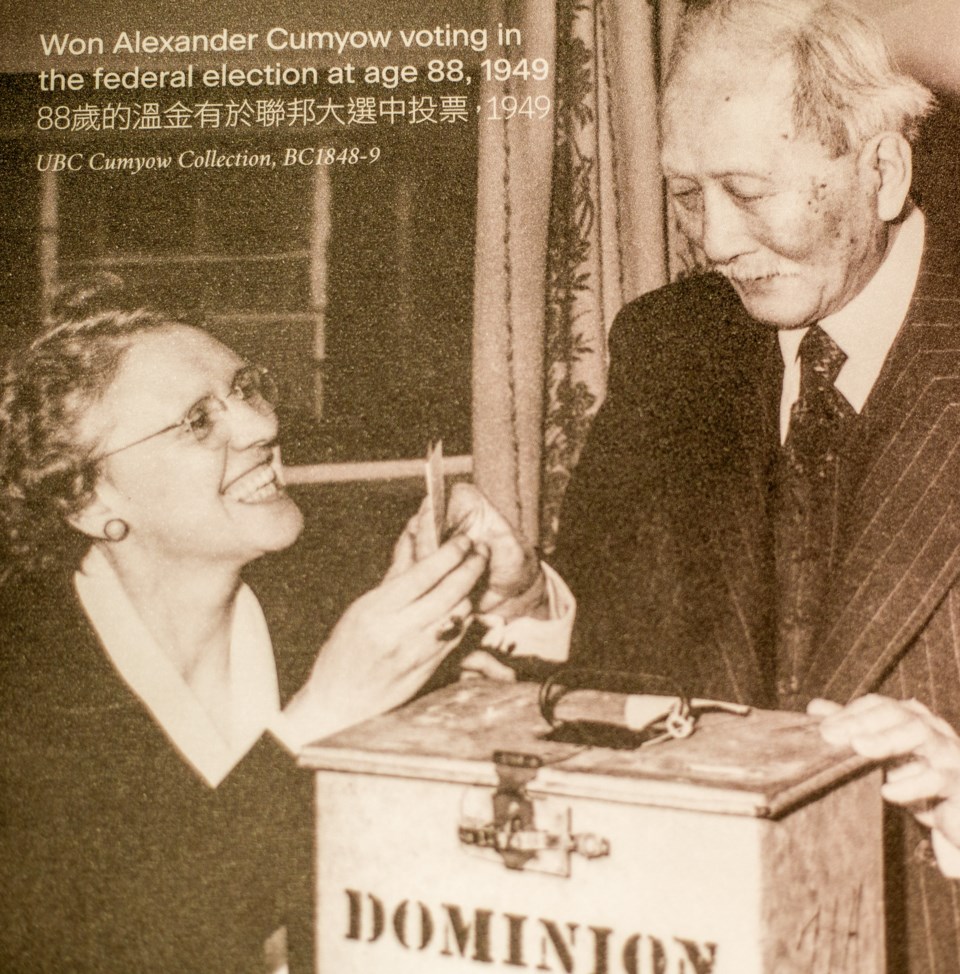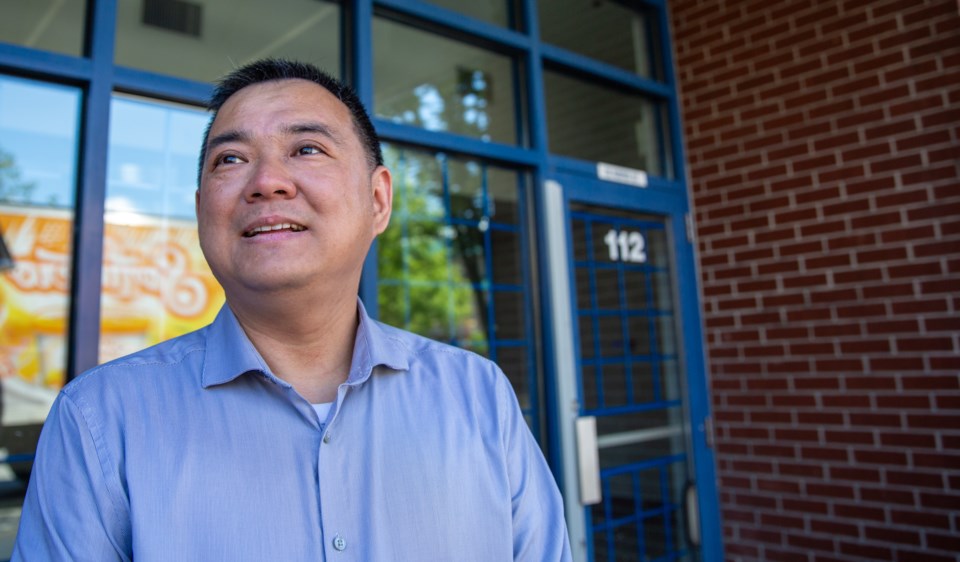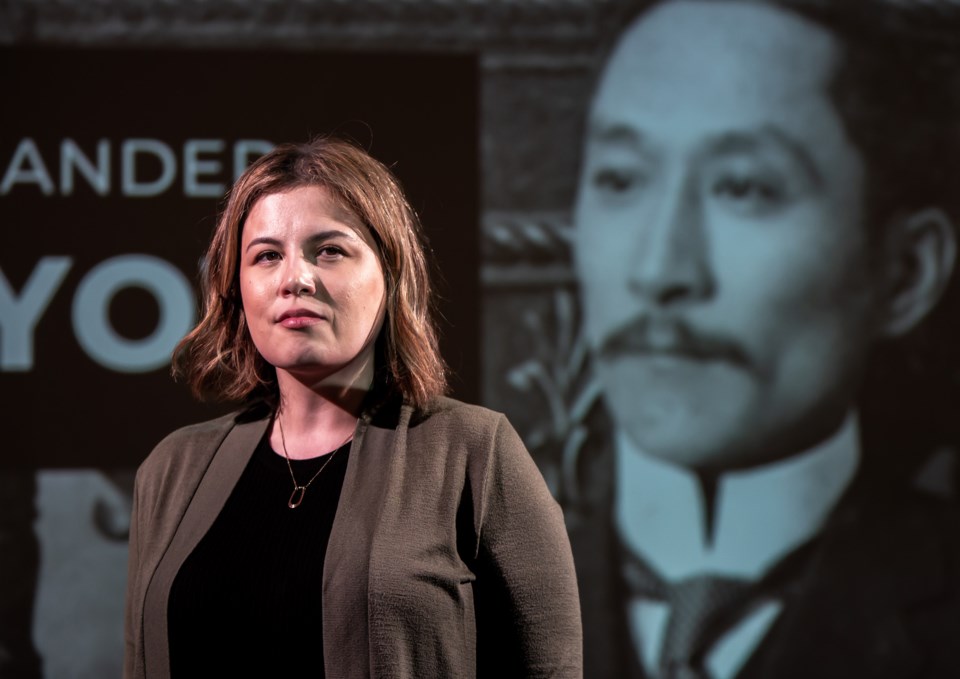A new City of Vancouver satellite office set to open in July in Chinatown is expected to be named after the first person of Chinese descent to be born in what is now present-day Canada.
Mayor Ken Sim and Coun. Lenny Zhou have prepared a motion to go before city council June 28 that recommends the city-owned storefront office at 112 Keefer St. be named after Won Alexander Cumyow.
“My heart literally is in my throat right now,” said Sim, who is Vancouver’s first mayor of Chinese descent. “The gravity of what we're doing today — I'm sorry, it's just blowing me away. I can't even speak right now. I apologize for that.”
Sim made those comments Thursday at a news conference held at the Chinatown Storytelling Centre on East Pender Street, where Cumyow’s story is represented in photographs and text.
Though council still has to formally approve the naming of the office, it is expected to pass because Sim’s ABC Vancouver party has the majority at city hall. Zhou and ABC colleagues Sarah Kirby-Yung, Brian Montague and Mike Klassen were present at the news conference.
So were several members of the Chinese community, including Carol Lee of the Chinatown Foundation, Fred Kwok of the Chinese Cultural Centre and former city councillors Raymond Louie and Daniel Lee.
Cumyow’s granddaughter Cynthia Waechtler, her husband Jim and their daughter Heidi were also present, with Heidi telling Glacier Media after the event that the recognition was “overwhelming.”
“I grew up knowing he was the first Chinese person born in Canada, and that was sort of all I knew,” she said.
“As I've gotten older, I've learned more about his history as a public servant and court interpreter. It's been really fascinating just to learn all of the things he did to build community within Chinatown and to bring people together.”
Added Heidi: “So it feels very fitting that he's being recognized at [the new city office], which is meant to create dialogue in community.”

Cumyow spoke multiple languages
Cumyow, an activist and interpreter, was born “around” March 21, 1861 in Port Douglas, B.C., according to the politicians’ motion. At the time of Cumyow’s birth, Canada was then known as British North America.
His parents’ choice of Chinese name, Cumyow — which literally translates to “gold have” — was likely a reflection of the Gold Rush period in which he was born, said the motion, which described him as a prominent leader in Vancouver’s Chinese community.
Cumyow was a founder of the Chinese Empire Reform Association and a president of the Chinese Benevolent Association. He spoke multiple languages including Hakka, Cantonese, English and Chinook Wawa.
By the 1870s, when his family moved to New Westminster, he was able to complete his education and training in law. In 1888, he used his language skills to become a Chinese and Chinook court interpreter for the Vancouver Police Department, a position he held until he retired in 1936.
When the Chinese first arrived in British Columbia, they were able to vote in provincial elections. But in 1872, B.C. became the first province to disenfranchise Chinese immigrants. The rest of Canada soon followed and by 1903 even Canadian-born Chinese were denied the vote.
It is believed that Cumyow voted before disenfranchisement, but no definitive records exist. But it is clear that he voted in the 1949 federal election because the Storytelling Centre has a photograph of the then-88-year-old Cumyow casting a ballot; it was only two years previous that voting rights were restored to Chinese-Canadians.
In 2020, Cumyow was shortlisted by the Bank of Canada for the new redesigned five-dollar bill alongside seven other important historical figures, including Terry Fox, Francis Pegahmagabow and Lotta Hitschmanova.
Cumyow died Oct. 6, 1955 in Vancouver.

Mayor, councillors will work out of Chinatown office
The new office, which was a campaign promise made by ABC Vancouver in last year’s civic election, will be set up to give the city a formal presence in Chinatown. At least two staff will be on hand, said Sim, who added that he will also work out of the office from time to time.
“It will be a place for elected officials to come down and be involved on the ground level with the community,” the mayor said. “The staff members there will also be able to field questions, and also administer the things that we're working on with respect to revitalizing Chinatown.”
Kirby-Yung said politicians and staff, who will be fluent in English and Chinese, expect to hear from small businesses and concerns about street cleanup, as well as other issues the community has faced in recent years.
Street disorder, graffiti and public safety have been top of mind for business owners and residents, as Glacier Media has previously reported since the pandemic was declared in 2020.
Chinese Canadian Museum opens July 1
Chinatown has been getting a lot of attention from council — Kirby-Yung said various initiatives launched under the ABC Vancouver-dominated council have totalled $2.1 million — and from the provincial and federal government.
In February, the federal government promised $1.8 million to the Vancouver Chinatown Foundation, with more than $1.3 million to be used to modernize buildings with new lighting, signs and awnings; those buildings include the Chinese Cultural Centre, the Storytelling Centre and Dr. Sun Yat-Sen Classical Gardens.
In May, the Chinese Canadian Museum received $5.1 million from the federal government. The museum, located in the Wing Sang building on East Pender Street, is expected to open July 1.
Also in May, the provincial government announced $2.2 million to the Vancouver Chinatown Foundation towards community infrastructure, lighting up shops throughout the neighbourhood, upgrading storefronts and revitalizing the Cultural Centre's façade.
Council also recently approved parking meter rates throughout Chinatown to be a $2 flat rate.
During Thursday’s news conference, a large photograph of Cumyow was displayed on a screen as a backdrop. His great granddaughter mentioned the image in answering a question about how he might have reacted to his name emblazoned on a city office in Chinatown.
“I never met him, but I think he would get a kick out of it,” she said.
“The fact we're all here together and that we're making space for growth and revitalization, I think that would be really exciting to him. And it's nice for me to see my mom connect with her family history. To see his face up on the screen, I think it had a lot of meaning for her.”




